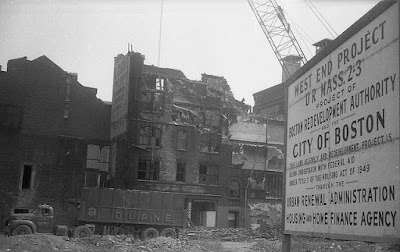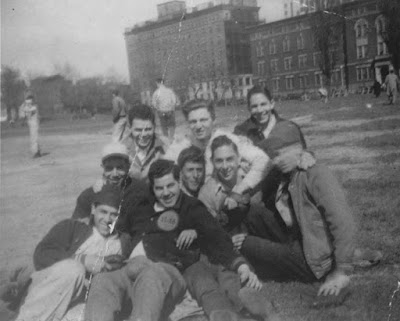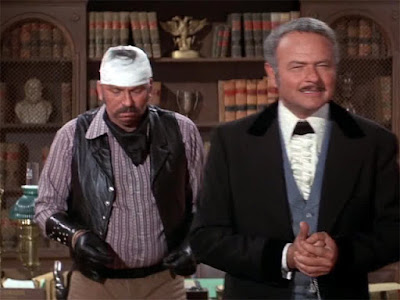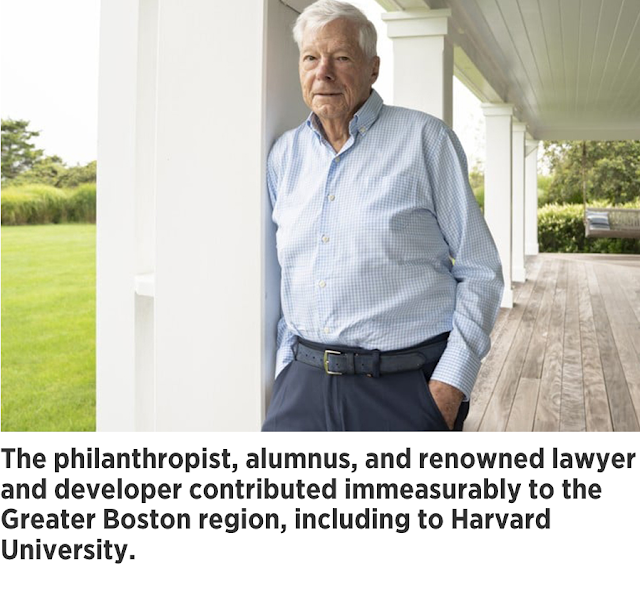The obituary page of The Massachusetts Spy
By Luke Reschuss
Obituary Editor
A very rich man died recently in Boston. His name was Jerry Rappaport. From the first obituaries, you would think that he was the embodiment of righteousness and generosity. Here's the fatuous Boston Globe eulogy:
Barely into his 20s, Jerry Rappaport was an academic prodigy who had finished Harvard College and Harvard Law School in about four years when he helped John B. Hynes defeat James Michael Curley in the historic 1949 mayoral election that changed the course of Boston history.
Though he quickly moved into powerful government posts, Mr. Rappaport soon realized his true path lay elsewhere — as a developer reshaping the city’s neighborhoods and skyline.
 |
| A whole neighborhood was destroyed to enrich Jerry Rappaport |
“Early on, I decided there’s a limitation in changing politics that I couldn’t do,” he said in an interview three weeks ago. “It was easier to rebuild the city than to change its politics.”
That's one way of putting it. Another way would be to describe how he actually made his fortune. Joan Venocchi of the Globe summed it up pretty well:
When he died earlier this month, at 94, Jerry Rappaport was hailed as a great philanthropist who also played a key role in developing a gleaming new Boston. A more complete picture of his legacy can be found at the West End Museum at 150 Staniford St.
The museum...tell[s] the story of a neighborhood demolished in the late 1950s in the name of urban renewal. This home to working-class Bostonians was ultimately replaced by Charles River Park, the luxury housing complex developed by Rappaport. A young Rappaport won the bid to redevelop the neighborhood after a stint in the administration of Mayor John Hynes. Afterward, .. the city allowed the Rappaport team to change the project terms. A set-aside for affordable housing was eliminated; instead, all units were designated for luxury apartments. To build them, about 53 acres of land were taken by eminent domain, and some 7,500 West Enders were displaced, in what is now considered a textbook case of urban planning gone bad.
 |
| Pre-Vulcan, he grew up in the West End. |
That seems ... different. A political insider finagles his way to destroying a thriving neighborhood for personal gain by lying about building affordable housing.
Indeed, if you want to see Rappaport's monument, swing by Charles River Park, which, true to the original grift, was build like a public housing project with pastel balconies glued on. It's as hideous today as when it was built in the 1950's.
What was the West End, anyway?
The West End Museum remembers:
The history of the West End is one of a largely immigrant neighborhood displaced or destroyed by ‘Urban Renewal‘ in a campaign that saw a third of Boston’s downtown demolished between 1958 and 1960, but it’s also the history of a diverse community that produced several influential people, boasted a unique culture and included many places of historical significance.
If a diverse vibrant urban community had to be sacrificed to enrich a greedy ruthless pol from . . . the Bronx, well, that was a small price to pay.
With the fortune that he made by mobilizing the power of government to line his own pockets, Rappaport devoted himself to passing himself off as a beloved philanthropist who gave millions to among other schnorrers Harvard for the study of, wait for it, state and local politics, which he had manipulated so expertly to his advantage.
With the fawning that accompanies any scoundrel who tosses a little pelf its way, Harvard remembered the old grifter thusly:
Harvard, working hard for the money, went on:
In the 1980s, Rappaport found himself in a position to pay it forward. As he noted: “I sent a letter [to Harvard] saying that I wanted to establish a Rappaport Fellowship for an elected official from Greater Boston…. I wanted people to understand that it was extremely important to understand how to create and implement public policy. Shortly after, I expanded the fellowship to include appointed officials. And the Kennedy School picked up and expanded this effort.”
This was the beginning of his significant philanthropy to Harvard, which also included funding to establish the Rappaport Institute for Greater Boston in 2000. The University-wide entity, housed at the Kennedy School, works to improve the governance of Greater Boston by strengthening connections among the region’s scholars, students, and civic leaders.
You've got to hand it to Jerry: He was shameless. Even John D. Rockefeller didn't endow an institute for the study of predatory monopoly.
Harvard did take a pass at describing rather incompletely the sordid source of Rappaport's largesse:
Charles River Park, a 48-acre development that broke ground in 1960, later became contentious because it razed a neighborhood and displaced low-income residents. He told Nantucket Magazine last summer that “[t]here was a sense of community that could have been handled better. But you have to understand that there wasn’t any experience with relocation at this size or scale.”
Nantucket Magazine? *chef's kiss*
 |
| Rare photo of Jerry Rappaport prior to Boston City Council vote |
By the way, lots of urban renewal projects involved destroying thriving urban neighborhoods. But in most cases at least some public housing was built on the ruins so some of the former residents had a place to live. But razing a neighborhood and replacing it with rich white people? Truly that had never been attempted on the scale of Jerry's Charles River Park. Or with such brazen disregard for the interests of those who lived there.
We can't prove it but we suspect that Jerry Rappaport provided the inspiration for Mel Brooks's great villain, Hedley Lamarr, who wanted to destroy the village of Rock Ridge to make money from a new railroad. He explained his problem to his loyal henchmen, which was the exact same quandary Jerry handled so deftly:
Unfortunately there is one thing standing between me and that property - the rightful owners.
And if you thought Harvard would ever spend one penny to compensate the victims of Rappaport's campaign of urban annihilation, then you're as clueless as the residents of Rock Ridge.



No comments:
Post a Comment